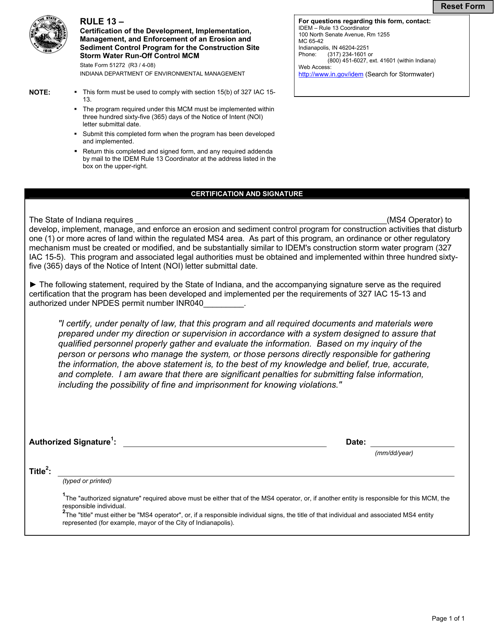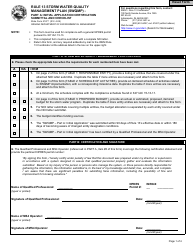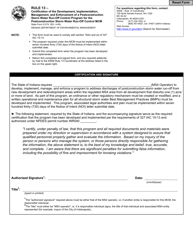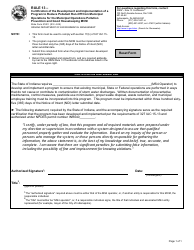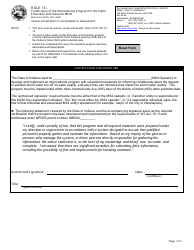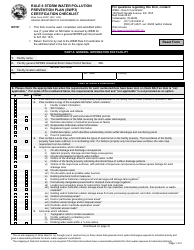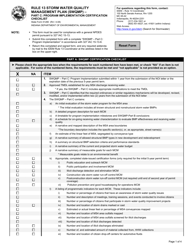State Form 51272 Rule 13: Certification of the Development, Implementation, Management and Enforcement of an Erosion and Sediment Control Program for the Construction Site Storm Water Run-Off Control Mcm - Indiana
What Is State Form 51272?
This is a legal form that was released by the Indiana Department of Environmental Management - a government authority operating within Indiana. As of today, no separate filing guidelines for the form are provided by the issuing department.
FAQ
Q: What is State Form 51272?
A: State Form 51272 is a certification form for the development, implementation, management, and enforcement of an erosion and sediment control program for construction site stormwater runoff control in Indiana.
Q: What does Rule 13 refer to?
A: Rule 13 refers to the specific rule that governs the certification of the development, implementation, management, and enforcement of an erosion and sediment control program for construction site stormwater runoff control in Indiana.
Q: What is the purpose of State Form 51272?
A: The purpose of State Form 51272 is to ensure that there is a certified erosion and sediment control program in place for construction sites in Indiana to control stormwater runoff and prevent erosion and sediment pollution.
Q: Who needs to complete State Form 51272?
A: Any construction site in Indiana that is required to have an erosion and sediment control program must complete State Form 51272 to certify their program's development, implementation, management, and enforcement.
Q: What does the Erosion and Sediment Control Program aim to achieve?
A: The Erosion and Sediment Control Program aims to control stormwater runoff and prevent erosion and sediment pollution on construction sites in Indiana.
Q: How is the Erosion and Sediment Control Program enforced?
A: The Erosion and Sediment Control Program is enforced by requiring construction sites to complete State Form 51272 and maintain a certified erosion and sediment control program.
Q: What is stormwater runoff?
A: Stormwater runoff refers to the water that flows over the ground during and after a rainstorm or snowmelt and does not soak into the ground.
Q: Why is controlling stormwater runoff important?
A: Controlling stormwater runoff is important to prevent erosion and the pollution of water bodies with sediment and other pollutants carried by the runoff.
Q: What is erosion?
A: Erosion refers to the process of soil and other materials being loosened and carried away by wind, water, or other natural agents.
Q: Why is preventing erosion important?
A: Preventing erosion is important to maintain soil fertility, prevent sediment pollution of water bodies, and protect infrastructure from damage.
Q: What is sediment?
A: Sediment refers to solid particles, such as soil, sand, and silt, that are transported and deposited by water, wind, or gravity.
Q: Why is preventing sediment pollution important?
A: Preventing sediment pollution is important to maintain water quality, protect aquatic ecosystems, and preserve the overall health of the environment.
Q: What is the Mcm in the document title?
A: The abbreviation 'Mcm' in the document title likely stands for 'Minimum Control Measure,' which is a term used in stormwater management to refer to specific actions or measures that are required to control stormwater runoff and prevent pollution.
Q: Is State Form 51272 specific to Indiana?
A: Yes, State Form 51272 is specific to Indiana and is used to certify erosion and sediment control programs for construction sites in the state.
Form Details:
- Released on April 1, 2008;
- The latest edition provided by the Indiana Department of Environmental Management;
- Easy to use and ready to print;
- Quick to customize;
- Compatible with most PDF-viewing applications;
- Fill out the form in our online filing application.
Download a fillable version of State Form 51272 by clicking the link below or browse more documents and templates provided by the Indiana Department of Environmental Management.
